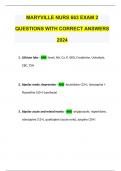MARYVILLE NURS 663 EXAM 2
QUESTIONS WITH CORRECT ANSWERS
2024
1. Lithium labs - ANS -level, NA, Ca, P, EKG, Creatinine, Urinalysis,
CBC, TSH
2. bipolar meds: depression - ANS -lurasidone (13+), olanzapine +
fluoxetine (10+) (symbyax)
3. bipolar acute and mixed mania - ANS -aripiprazole, risperidone,
olanzapine (13+), quetiapine (acute only), azepine (10+)
,4. classic mood stabilizers - ANS -Lamotrigine (excellent medication
to use), lithium, Depakote (avoid in females if possible due to
PCOS and Pregnancy), Tegretol, Trileptal (no evidence for true
Bipolar disorder)
5. anti-depressants - ANS -class not used w/bipolar disorder
6. lithium - ANS -Anti-manic, antidepressant, anti-suicidal
7. Lithium side effects - ANS -Frequent urination, increased thirst,
weight gain, sedation
8. lithium toxicity - ANS -sudden onset tremors, N/V/D, muscle
weakness, slurred speech, confusion, seizures (slowing down, feel
really out of it)
,9. Persistent Motor or Vocal Tic Disorder - ANS -put in front of you
only has one or the other but not both—they usually don't even
know it is a tic, it is only meaningful if it's affecting their quality of
life
10. Tourette's d/o - ANS -Multiple motor and at least one vocal
tic (some tics come and go, they don't have them all at the same
time to receive the diagnosis)
11. HRT - ANS -habit reversal training can be used to manage
tics
12. Tics Tx - ANS -Alpha agonists (clonidine, guanfacine); Haldol
is not the first-line txt
, 13. Developmental Coordination Disorder - ANS -a motor
disorder characterized by marked impairment in the development
of motor coordination; movement isn't consistent w/age
14. Stereotypic Movement Disorder - ANS -a motor disorder
characterized by repetitive, seemingly driven, and apparently
purposeless motor behavior, such as hand waving or head
banging, but not include ASD sx
15. Specific Learning Disorders - ANS -difficulties in the
acquisition and use of listening, speaking, reading, writing,
reasoning, or mathematical abilities; dx by other professionals
w/specialized training; NP Tx comorbid d/o




